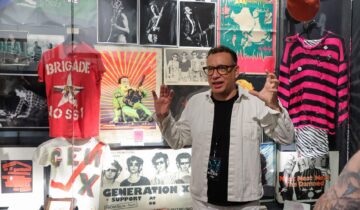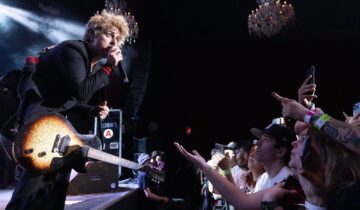 For the ECONOMIST: In November last year, Taylor Swift withdrew most of her music from Spotify, complaining that the music-streaming service made her music available to all users, not just paying subscribers. She had previously called Spotify’s payments to musical artists—on average less than a penny per song—stingy. Nor is Spotify the only one to attract Swiftian scorn: she has withheld her latest album, “1989”, from Apple’s new music-streaming service, describing their free, three-month trial period, in which artists would get no royalties, as “shocking” and “disappointing” on Tumblr.
For the ECONOMIST: In November last year, Taylor Swift withdrew most of her music from Spotify, complaining that the music-streaming service made her music available to all users, not just paying subscribers. She had previously called Spotify’s payments to musical artists—on average less than a penny per song—stingy. Nor is Spotify the only one to attract Swiftian scorn: she has withheld her latest album, “1989”, from Apple’s new music-streaming service, describing their free, three-month trial period, in which artists would get no royalties, as “shocking” and “disappointing” on Tumblr.
Much of this is for show. Ms Swift’s paying fans can still listen to her older songs on other services, including Beats Music, Rhapsody, TIDAL and Rdio, and the vast majority of her catalogue is available free on YouTube. Despite that, she sold more than a million copies of “1989” in the first week, and 5m by mid-summer, making it the fastest-selling album in more than a decade.
Ms Swift says that the argument about fair compensation isn’t really about her. She can support herself, her band, crew, and entire management team by playing live shows: at last count, her “1989” tour had grossed over $86m. The real problem is for those whose star-power is more modest than that of Ms Swift’s supernova. Despite technology that puts more power into the hands of musicians—to make websites, sell merchandise, book their own shows and connect with fans—many continue to sign old-fashioned, complex paper contracts regarding the rights to their music. These play to the strengths of lawyers and accountants, not lyricists and tunesmiths, ensuring that more money flows to handlers than to creators.
But now artists and their supporters are fighting back. The Institute for Creative Entrepreneurship at Berklee College of Music in Boston has spent nine months studying the fairness of compensation structures, poring over royalty statements, publishing agreements and data from music publishers, and interviewing industry figures. The conclusion? “The back end of the music industry is just a nightmare,” says Allen Bargfrede, the executive director of ReThink Music project, and a professor in music business at Berklee. “The ability to track copyrights is just a mess. But, the difference now is that information is more trackable. 20 years ago, you had more artists saying ‘Where is my money?'” Now, they theoretically have more tools to find out.
And yet too many musicians are still wondering why their money trickles in from digital services fractions of pennies. In an effort to promote change, Mr Bargfrede and his team came up with recommendations to the entire industry. They advocate a Creator’s Bill of Rights, which would establish an ethical set of guidelines and create a copyright database, somewhat like the ICANN system that keeps track of online domain names, with a non-profit acting as the middle-man to oversee the registry and create a commercial system around it.
The advocates also say that the American Copyright Office needs to update its standards to fit with today’s predominantly digital distribution models. “If I’m making a movie and want to use a song, there is nowhere to go,” Mr Bargfrede says. “I have to hire a licensing attorney, and execute a license. It gets so complicated, even more so with digital services. People don’t know who to pay.”
But the institute’s report does not call out musicians for relying solely on their creative juices to get by. It should. The likes of Beyoncé, Katy Perry and Taylor Swift do not need to be their own accountants. But for the average working musician, a cultural shift is needed: musicians can’t rely simply on their ability to craft a tune, hoping that their handlers are both honest and competent. A growing list of music-tech start-ups, advocacy groups, and academic research groups are trying to help, but the artists must ultimately be their own bosses. The digital tools are there waiting to be grasped and used: artists can monitor user data across web platforms, locate fans online and track their interests, form touring strategies that better serve those fans, and experiment with business decisions that are responsive to “super fans” who are willing to spend more on meet-and-greets, private acoustic sets and other extras.
Other groups are trying to generate debate and awareness. The Britain-based Featured Artists Coalition campaigns for the rights of musicians and performers. Earlier this year, David Byrne, the former front-man for Talking Heads, joined the board of SoundExchange, a non-profit performance-rights organisation that collects and distributes digital performance royalties to artists and copyright-holders. Mr Byrne took to the New York Times’s op-ed page in July to call on the industry to open up its financial “black box”. The Washington-based non-profit Future of Music Coalition provides education, research and advocacy for musicians. More university music programs are offering coursework and degrees in music business, with an aim to better prepare people to engage with the industry. And artists are taking the view that sharing information is empowering: Zoe Keating, a cellist, posts Spotify royalty payments online so fans can see exactly what musicians receive for their work. (Answer: in 2014, $2,897 for 712,039 streams of her recordings.)
But for the most part, artists’ managers still run the business, with most artists still too passive. Mr Bargfrede laments that “It’s usually the same handful of artists speaking out, not a broad base of them standing up.” There may not be much money in hundreds of thousands of Spotify plays, but there is power in numbers.



